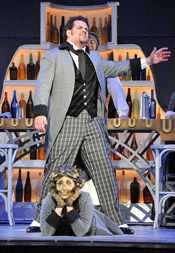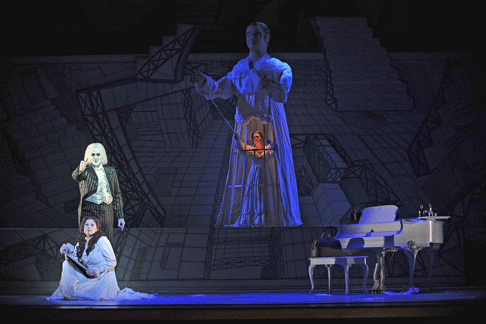Recently in Performances
English Touring Opera are delighted to announce a season of lyric monodramas to tour nationally from October to December. The season features music for solo singer and piano by Argento, Britten, Tippett and Shostakovich with a bold and inventive approach to making opera during social distancing.
This tenth of ten Live from London concerts was in fact a recorded live performance from California. It was no less enjoyable for that, and it was also uplifting to learn that this wasn’t in fact the ‘last’ LfL event that we will be able to enjoy, courtesy of VOCES8 and their fellow vocal ensembles (more below …).
Ever since Wigmore Hall announced their superb series of autumn concerts, all streamed live and available free of charge, I’d been looking forward to this song recital by Ian Bostridge and Imogen Cooper.
Although Stile Antico’s programme article for their Live from London recital introduced their selection from the many treasures of the English Renaissance in the context of the theological debates and upheavals of the Tudor and Elizabethan years, their performance was more evocative of private chamber music than of public liturgy.
Evidently, face masks don’t stifle appreciative “Bravo!”s. And, reducing audience numbers doesn’t lower the volume of such acclamations. For, the audience at Wigmore Hall gave soprano Elizabeth Llewellyn and pianist Simon Lepper a greatly deserved warm reception and hearty response following this lunchtime recital of late-Romantic song.
For this week’s Live from London vocal recital we moved from the home of VOCES8, St Anne and St Agnes in the City of London, to Kings Place, where The Sixteen - who have been associate artists at the venue for some time - presented a programme of music and words bound together by the theme of ‘reflection’.
'Such is your divine Disposation that both you excellently understand, and royally entertaine the Exercise of Musicke.’
‘And there was war in heaven: Michael and his angels fought against the dragon; and the dragon fought and his angels, And prevailed not; neither was their place found any more in heaven … that old serpent … Satan, which deceiveth the whole world: he was cast out into the earth, and his angels were cast out with him.’
There was never any doubt that the fifth of the twelve Met Stars Live in Concert broadcasts was going to be a palpably intense and vivid event, as well as a musically stunning and theatrically enervating experience.
‘Love’ was the theme for this Live from London performance by Apollo5. Given the complexity and diversity of that human emotion, and Apollo5’s reputation for versatility and diverse repertoire, ranging from Renaissance choral music to jazz, from contemporary classical works to popular song, it was no surprise that their programme spanned 500 years and several musical styles.
The Academy of St Martin in the Fields have titled their autumn series of eight concerts - which are taking place at 5pm and 7.30pm on two Saturdays each month at their home venue in Trafalgar Square, and being filmed for streaming the following Thursday - ‘re:connect’.
The London Symphony Orchestra opened their Autumn 2020 season with a homage to Oliver Knussen, who died at the age of 66 in July 2018. The programme traced a national musical lineage through the twentieth century, from Britten to Knussen, on to Mark-Anthony Turnage, and entwining the LSO and Rattle too.
With the Live from London digital vocal festival entering the second half of the series, the festival’s host, VOCES8, returned to their home at St Annes and St Agnes in the City of London to present a sequence of ‘Choral Dances’ - vocal music inspired by dance, embracing diverse genres from the Renaissance madrigal to swing jazz.
Just a few unison string wriggles from the opening of Mozart’s overture to Le nozze di Figaro are enough to make any opera-lover perch on the edge of their seat, in excited anticipation of the drama in music to come, so there could be no other curtain-raiser for this Gala Concert at the Royal Opera House, the latest instalment from ‘their House’ to ‘our houses’.
"Before the ending of the day, creator of all things, we pray that, with your accustomed mercy, you may watch over us."
The doors at The Metropolitan Opera will not open to live audiences until 2021 at the earliest, and the likelihood of normal operatic life resuming in cities around the world looks but a distant dream at present. But, while we may not be invited from our homes into the opera house for some time yet, with its free daily screenings of past productions and its pay-per-view Met Stars Live in Concert series, the Met continues to bring opera into our homes.
Music-making at this year’s Grange Festival Opera may have fallen silent in June and July, but the country house and extensive grounds of The Grange provided an ideal setting for a weekend of twelve specially conceived ‘promenade’ performances encompassing music and dance.
There’s a “slide of harmony” and “all the bones leave your body at that moment and you collapse to the floor, it’s so extraordinary.”
“Music for a while, shall all your cares beguile.”
The hum of bees rising from myriad scented blooms; gentle strains of birdsong; the cheerful chatter of picnickers beside a still lake; decorous thwacks of leather on willow; song and music floating through the warm evening air.
Performances
![David Pomeroy as Hoffmann and Elizabeth Futral as Giulietta [Photo by Gaston de Cardenas courtesy of Florida Grand Opera]](http://www.operatoday.com/FGO_Hoffmann_01.gif)
06 Feb 2011
Les Contes d’Hoffmann, Florida Grand Opera
If you are ever lucky enough to have the opportunity to catch a great exponent of just one of two major roles — the heroines or villains — in Offenbach’s Les Contes d’Hoffmann, you should secure a seat maintenant.
If both of those roles are taken up by such
the rarified performer, it would behoove you to stage a sit-in at the box
office. Florida Grand Opera can boast to the latter situation with its
production of Hoffmann (seen opening night, January 22).
The detail in three of Bradley Garvin’s four villains, each with
oodles of personal stamp, made it easy to forget that he has taken the roles up
only 15 times, covering them at the Met last season. This was the
bass-baritione’s FGO debut. Lindorf was a less developed, more ambiguous
character for Garvin — a bother for certain, probably not evil incarnate.
By turns, Garvin’s Dr. Miracle was cruelly insinuating and, knowing
Antonia’s heart, ruthlessly played on her weaknesses. Garvin’s
transformation included a more backward vocal placement and an eerie French
brogue, adding a backward leaning stance and the creepy pointing of bony
digits; this Dr. Miracle exorcised the living force within Antonia with quiet
mayhem.
 David Pomeroy as Hoffmann and Katherine Rohrer as The Muse/Nicklausse
David Pomeroy as Hoffmann and Katherine Rohrer as The Muse/Nicklausse
In Elizabeth Futral’s first essaying of the four heroines, her
greatest challenge may well be making a believable woman-as-object out of
Olympia in a production that plays up the phantasmagorical in Offenbach’s
story. Olympia’s costume is a cumbersome cubed-patterned dress, with an
exaggerated petticoat that gives way to a box and keyhole — her cranking
mechanism. Futral darkened her voice, her word texturing the stuff of magic
itself, as she became a helpless and aimless Antonia, on breakneck course to
lose her soul.
Hoffmann was the role of David Pomeroy’s Metropolitan Opera debut in
2009 and the Canadian tenor did many things right in his opera debut with FGO.
The tale of the dwarf Kleinzach was finished well, his singing in the duet with
Antonia was impassioned, and by the epilogue, Pomeroy had plenty in reserve to
return to the final revelation of the Kleinzach legend. His voice is a husky
one that he covers or not at will below the passagio — this is Hoffmann
as a bit of a brute.
In another company debut, Conductor Lucy Arner seemed at home in the French
Romantic repertoire. Arner’s keen sense of tempi and firm hand made
rhythmic timing with singers — one of Hoffmann’s musical moguls
— look easy. The type of delicate instrument playing elicited for
Nicklausse’s short solo in Antonia’s Act reminded that the
conductor has extensive experience in chamber music. Katherine Rohrer (The
Muse/Nicklausse) is a real sprite, most memorable in the latter song and in
serially mocking Hoffmann’s attraction for Olympia. Matthew Dibattista
took on Offenbach, Cochenille, Frantz and Pitchinaccio, carrying on especially
heartily in Frantz’s aria. Phillip Skinner made both Luther and Crespel
relevant. FGO was rewarded by entrusting the roles of Henri Meilhac, Wolframm,
and Schlemil to Young Artist Craig Colclouch. Other Young Artists that
acquitted themselves favorably were James Barbato (Wilhelm), Jonathan G.Michie
(Hermann), Daniel Shirley (Nathanail); Young Artist Courtney McKeown’s
assignment as Antonia’s mother is rather unorthodox here, from the inside
of a huge male action figure, she moved the thing about as she sang.
 Elizabeth Futral as Antonia, Bradley Garvin as Dr. Miracle and Courtney McKeown as Antonia’s mother
Elizabeth Futral as Antonia, Bradley Garvin as Dr. Miracle and Courtney McKeown as Antonia’s mother
This joint production of Opera Colorado, Opera Theatre of Saint Louis and
Boston Lyric Opera emphasizes the “dreamlike” over the cerebral in
Hoffmann’s tales. It was as if Andre Barbe (sets and costumes) and Guy
Simard (lighting) heaved mixed chunks of Willy Wonka and Dr.
Who on the Olympia and Giulietta Acts. A stage-sized screen with sliding
doors opens to an Offenbach shrine in gold in the middle of Spalanzani’s
workshop. Lime green lab coats and garbage-pail-inspired robots are the stuff
at the workshop and serpentine seahorse headdresses, and rolling staircase
gondolas, a nod to the ‘Barcarolle’ and Venice. If M.C. Escher
etching look-a-likes behind the doors in each act seemed out of place, they did
much to draw the eye downstage. Renaud Doucet’s meticulous consideration
of blocking and movement — each person, down to the last super, had a
place to be and executed some purposeful action — was total. Lastly,
FGO’s ensemble singing overall was as good as it has been since 2005 and
John Keene’s chorus put on a performance of all-around distinction.
Robert Carreras
![David Pomeroy as Hoffmann and Elizabeth Futral as Giulietta [Photo by Gaston de Cardenas courtesy of Florida Grand Opera]](http://www.operatoday.com/FGO_Hoffmann_01.gif)

